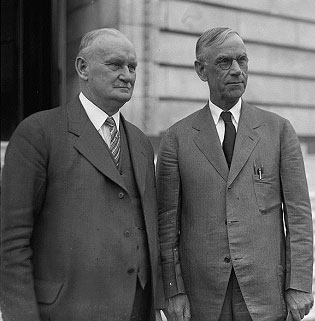
Source: Hawley (left) and Reed Smoot in April 1929, shortly before the Smoot HawleyTariff Act passed the House, National Photo Company, Library of Congress

Source: Hawley (left) and Reed Smoot in April 1929, shortly before the Smoot HawleyTariff Act passed the House, National Photo Company, Library of Congress
As the United States faced the economic crisis of the Great Depression, there was a global economic crisis affecting other nations. Many countries, especially Europe, were recovering from the economic effects of World War I. As part of the post-war recovery, the agricultural industry increased production worldwide. Soon American farmers, already facing an economic downturn in the United States, were faced with foreign competition in the agricultural industry.
As part of his presidential campaign, President Herbert Hoover promised to protect American farmers by raising tariffs. In 1930, that campaign promise became a reality when the Smoot-Hawley Tariff Act was passed. Initially, the tariff act was passed to raise taxes on imports to protect American farmers.
The Smoot-Hawley Tariff kept foreign countries from competing with American industries. In response, foreign countries raised their own tariffs on imports, and soon global trade began to decline, further deepening the state of the Great Depression.
According to the U. S. Department of State,
“U.S. imports from Europe declined from a 1929 high of $1,334 million to just $390 million in 1932, while U.S. exports to Europe fell from $2,341 million in 1929 to $784 million in 1932. Overall, world trade declined by some 66% between 1929 and 1934. More generally, Smoot-Hawley did nothing to foster trust and cooperation among nations in either the political or economic realm during a perilous era in international relations.”
Read the excerpt from the Smoot-Hawley Legislative Bill below.
"An Act to provide revenue, to regulate commerce with foreign countries, to encourage the industries of the United States, to protect American labor, and for other purposes."
— Excerpt from the Smoot-Hawley Tariff Legislative Bill, 1930
Analyzing the excerpt: The excerpt above reflects the purpose that Congress had for the Smoot-Hawley Tariff. Did the tariff fulfill the purpose that Congress intended? How did the tariff contribute to the cause of the Great Depression?
